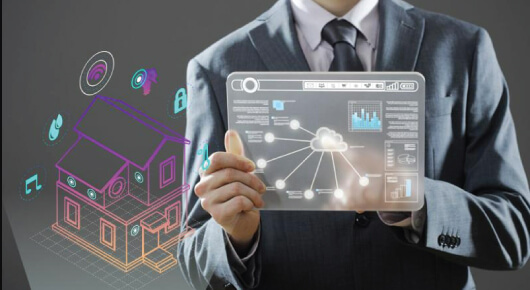
According to the Global Property Guide website, after a decade-long house price boom, Malaysia’s housing market has experienced a slowdown in the past two years due to massive oversupply. In major cities, there are MYR 18.48 billion (US$ 4.41 billion) unsold apartments, especially high-end properties. Furthermore, the COVID-19 pandemic has crippled the demand, pressured the house prices downward. As a result, Malaysia’s house price index rose a minuscule 0.3% during the year to Q1 2021, down from the previous year’s 1.9% y-o-y increase, according to the Valuation and Property Services Department (JPPH).
There is a silver lining in the dark pandemic cloud; it accelerates digital transformation. The call for digital transformation offers the real estate industry player an opportunity to complement digital in their brick-and-mortar products. And, digitalization typically adds sophistication into products and services, with personalization as an extra value that customers welcome, generating a new income stream for developers.
Teh Hon Seng, CEO of TimeTec Group that specializes in proptech, commented, “For example, developers can provide options such as renovation during the build to save buyer’s time and unnecessary building material waste, offer full built-in-furniture set according to buyer’s design and taste, create a smart home, and more. Eventually, Vacant Possession may not be a good practice anymore because once the property is ready for handover, more house buyers would prefer the move-in ready homes. In addition, if a factory in the IR4.0 era can produce personalized products in a mass production environment, developers do not necessarily have to adhere to standardization in building houses.”
Besides the capability to handle the sophisticated processes to deliver personalization services to customers, the developer can also continue its services beyond the warranty period, sustaining the engagement with the house buyers extended to their family members and tenants. In other words, developers can consider broadening their business reach to intangible services to include property management.
Mr Teh said, “This is because build-and-sell is relatively short-term; if compared to almost perpetual a building, it is being used for its built purpose. Therefore, with appropriate digital tools, not only the business extension is viable; but the once meagre income generated from the property management could potentially be quite lucrative with enough creativity input.”
Township developers grasped the digital change because customer engagement is always one of their most challenging dreams to realize but has now become so easy with digital technologies. And for developers that never take property management seriously in the past, it may be the right time to think about the steady and consistent income it can generate in the long run.
Diagram 1.0: Bridging Two Real Estate Business Models with Digital Technologies
“Digital transformation (DX) improves cost-efficiency and productivity, but it brings more meaningful purpose if it finally leads to business transformation (BX). One cost-saving example is that installing a traditional intercom system in an apartment project costs several hundred thousand; the new subscription-based smart community system can easily replace the intercom system, almost eliminating the entire cost. And the management can use the same system to handle day-to-day operations and comprehensive tenant activities, generating massive data that can provide insightful analytics to transform the developer’s business. To be more specific, business transformation (BX) is different from business diversification. Unlike diversification, if establishing a new business, business transformation (BX) normally co-relates with the developer’s core business which the developer is quite familiar with, easier to adopt, and at the same time, add value to the property itself.” Teh explained.
The following diagram 2.0 elaborates the digital transformation (DX) in stages, how it transforms one’s traditional business to digital business, the digital technology components involved, cloud computing as its fundamental infrastructure, and the significant benefits to business owners.
Diagram 2.0: Overview of Digital Transformation (DX)
How does digital transformation (DX) significantly impact property management? From the property management perspective, isolation of every activity adds complications in building management in the past. But nowadays, the sophistication in digital technologies help to deliver simplicity in building management by combining all functionalities in one App. Thus, at the administration level, it achieves consolidation in management, and at the user level, it integrates all the necessary activities.
Diagram 3.0 illustrates TimeTec Digital Building Ecosystem with the One-App-manage-it-all concept, how mobile App becomes a necessary tool for users to perform the everyday activities in a building. For users, be it inviting a guest, making a complaint, booking a gym, paying a maintenance bill, ordering food or merchandise, accessing parking, turnstile, lift and door, joining an event, taking a poll, filling a form, intuitively by using an App. And for management, be it making an announcement, organizing an event, maintaining facilities and equipment, monitoring surveillance cameras, collecting parking fees, managing workers and more, all by using a cloud admin portal and App with admin login. Outsource parking management to a parking operator becomes unnecessary. The management can also explore new digital business ideas with the available near field commerce module, Airbnb module, and co-working space module.
Diagram 3.0: Overview of TimeTec Digital Building Ecosystem
One of the incredible capabilities of the cloud ecosystem is to integrate all the related and unrelated activities, free-flowing the data from one activity to another, changing the once used-to-be hardware-driven market to become software-driven. Therefore, developers are encouraged to adopt Building Information Modelling (BIM) to enable data generation and pass on the data from the first day a building is designed. The outdated ELV (Extra Low Voltage) devices that formed multiple data islands that are poor in connectivity should be replaced by data-induced IoT (Internet of Things) devices to ensure better building maintenance and management. When dealing with IoT devices, software or the cloud application should come first, reversing the old practice. A lot to be learned and unlearned when it comes to digital transformation (DX).
The top digital transformation (DX) market research firm in the world, International Data Corporation (IDC), unveiled a report, IDC Future Scape: Worldwide Digital Transformation 2021 Predictions. There are a few noteworthy predictions as follows to be shared with the real estate and property management industry:
Prediction 4: The Rise of the Digital Platform and Extended Ecosystems. By 2025, driven by volatile global conditions, 75% of business leaders will leverage digital platforms and ecosystem capabilities to adapt their value chains to new markets, industries, and ecosystems.
Prediction 6: Business Model Reinvention. By 2021, at least 30% of organizations will accelerate innovation to support business and operating model reinvention, fast-tracking transformation programs to future-proof their businesses.
Prediction 7: Sustainability and DX. By 2022, most companies will realize the greater value by combining digital and sustainability, giving rise to digitally-driven and sustainably enabled projects as the de-facto standard.
Prediction 9: Accelerating Digital Experiences. By 2022, 70% of all organizations will have accelerated the use of digital technologies, transforming existing business processes to drive customer engagement, employee productivity, and business resiliency.
All industries can apply Digital transformation (DX). The potential is enormous when DX and BX are added to one’s business. For example, we witnessed automaker Tesla, with its DX and BX capability displayed to the world, has become the most valuable car company globally and more valuable than the next six automakers combined with a valuation at $775 billion at the time of writing. When the car moves towards autonomous, it will become more digital and create more value; the same for the real estate industry, more digital will spark endless possibilities.
For any housing developer who wants to know more about the TimeTec Digital Building or Smart Township Ecosystem for their development project, please contact Mr. Aiden Teh at aiden@i-neighbour.com (010-2211150), or Mr. Kelvin Lim at kelvin.lim@timeteccloud.com (012-6891180). Our general line and email: 03-80709933 and info@timeteccloud.com. You can also write to us at info@timeteccloud.com for consultation and presentation.
For more information, please visit our website at: www.timeteccloud.com, www.timetecbuilding.com
About TimeTec
TimeTec Group was established in 2000. Over 20 years, the Group had developed three homegrown globally recognized IT brands, FingerTec, TimeTec and iNeighbour, for workforce management, security, smart office, smart residential and smart township solutions by unleashing of the power of biometrics, cloud & edge computing, IoT and AI technologies. All these solutions connect and change the landscape of work life and home life in a larger ecosystem. Through a vast network, TimeTec Group distributes its biometric hardware products and 16 cloud applications, including IoT devices, to more than 150 countries worldwide. Visit our company websites at TimeTec Cloud, FingerTec, iNeighbour, TimeTec Building
Various renowned clients have subscribed to TimeTec various solutions including IOI Properties, Putrajaya Holdings, Ibraco, Binastra, Thriven, Hock Seng Lee, QSR Brands, Central Sugars Refinery CSR, Sunway Constructions, Mamee, Yakult, Nano Malaysia Berhad, and many more. The versatility and feasibility of TimeTec products also attract various international customers from all over the world, including Hong Kong, Dubai, Australia, South Africa and etc.











